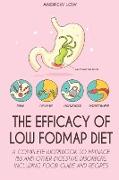THE EFFICACY OF LOW FODMAP DIET
BücherAngebote / Angebote:
A low-FODMAP diet is designed to help people with irritable bowel syndrome (IBS) have better control over their symptoms by limiting certain foods. FODMAPs stands for fermentable oligo-saccharides, di-saccharides, mono-saccharides and polyols. Put more simply, FODMAPs are certain types of carbohydrates -- the sugars, starches, and fiber in foods.For most, these foods are not a problem unless you eat too much of them. But some people are sensitive to them.FODMAPs draw water into your digestive tract, which could make you bloated. If you eat too much of them, they can hang around in your gut and ferment.Researchers discovered that the small intestine does not absorb FODMAPs very well. They increase the amount of fluid in the bowel. They also create more gas. That's because bacteria in the colon they are easily fermented by colonic bacteria. The increased fluid and gas in the bowel leads to bloating and changes in the speed with which food is digested. This results in gas, pain and diarrhea. Eating less of these types of carbohydrates should decrease these symptoms. Many people with IBS who use the low-FODMAP diet say it helps them. It may allow you to:· Have fewer digestive symptoms, like gas, bloating, diarrhea, and constipation· Manage your IBS symptoms without taking medicine· Improve your quality of life In general, FODMAPs are part of a nutritious diet and healthy individuals should continue to enjoy their benefits. Milk and dairy products are great sources of calcium, which helps build strong bones and ward off osteoporosis. Fruits and veggies contribute to our daily fibre intake and are full of vitamins and minerals. Legumes are a great source of protein, especially important in a vegetarian's diet. Oligo-saccharides, such as onions and garlic, also selectively promote the growth of beneficial bacteria in the colon, which then discourages growth of harmful bacteria such as E. coli.
Folgt in ca. 15 Arbeitstagen




